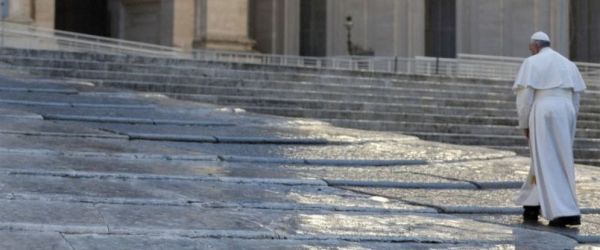Today’s passage records these words of Jesus: “My sheep hear my voice, and I know them, and they follow me; and I give them eternal life, and they shall never perish, and no one shall snatch them out of my hand. My Father, who has given them to me is greater than all, and no one is able to snatch them out of the Father’s hand. I and the Father are one” (10:27-30). These four verses contain the whole of Jesus’ message; it is the nucleus of his Gospel: he calls us to share in his relationship with the Father, and this is eternal life.
Jesus wants to establish with his friends a relationship which mirrors his own relationship with the Father: a relationship of reciprocal belonging in full trust, in intimate communion. To express this profound understanding, this relationship of friendship, Jesus uses the image of the shepherd with his sheep: he calls them and they recognize his voice, they respond to his call and follow him. This parable is very beautiful! The mystery of his voice is evocative: only think that from our mother’s womb we learn to recognize her voice and that of our father; it is from the tone of a voice that we perceive love or contempt, affection or coldness. Jesus’ voice is unique! If we learn to distinguish it, he guides us on the path of life, a path that goes beyond even the abyss of death.
However Jesus, at a certain point, said: “my Father, who has given them to me...” (Jn 10:29), referring to his sheep. This is very important, it is a profound mystery, far from easy to understand. If I feel drawn to Jesus, if his voice warms my heart, it is thanks to God the Father who has sown within me the desire for love, for truth, for life, for beauty... and Jesus is all this in fullness! This helps us understand the mystery of vocation and especially of the call to a special consecration. Sometimes Jesus calls us, he invites us to follow him, but perhaps we do not realize that it is he who is calling, like what happened to the young Samuel. There are many young people today, here in the Square. There are large numbers of you aren’t there? It’s clear.... Look! Here in the Square today there are so many of you! I would like to ask you: have you sometimes heard the Lord’s voice, in a desire, in a worry, did he invite you to follow him more closely? Have you heard him? I can’t hear you? There! Have you wanted to be apostles of Jesus? We must bet on youth for the great ideals. Do you think this? Do you agree? Ask Jesus what he wants of you and be brave! Be brave! Ask him this!
Behind and before every vocation to the priesthood or to the consecrated life there is always the strong and intense prayer of someone: a grandmother, a grandfather, a mother, a father, a community.... This is why Jesus said: “Pray therefore the Lord of the harvest”, that is, God the Father, “to send out labourers into his harvest” (Mt 9:38). Vocations are born in prayer and from prayer; and only through prayer can they persevere and bear fruit.
[Pope Francis, Regina Coeli 21 April 2013]












